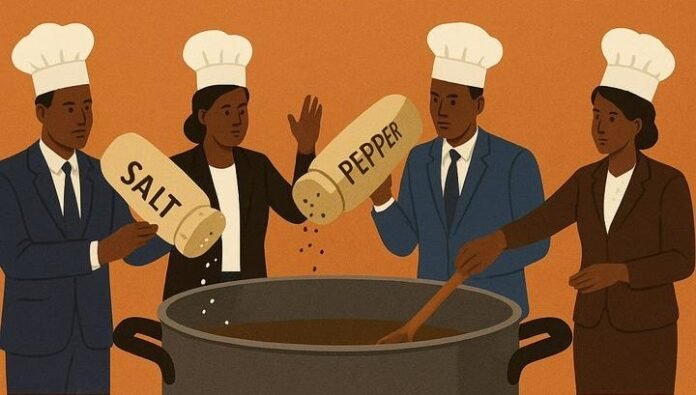By Mahmud Tim Kargbo
In Sierra Leone, as in many other nations, the impulse to regulate food and diet through central authority has intensified. New laws, regulations, standards and inspection regimes dictate what food may be sold, how it should be labelled and how citizens ought to eat. Yet despite this growing bureaucracy, malnutrition persists, food insecurity remains widespread and the burden of non-communicable diseases is rising. The crucial question is whether more central control makes Sierra Leoneans healthier, or whether it achieves precisely the opposite.
The Framework of Food Control in Sierra Leone:
The Food and Feed Safety Act, 2017 established the Food and Feed Safety Authority to regulate labelling, testing and inspection of food. The Act was intended to “protect the public against health hazards and ensure food safety standards”. (http//:www.parliament.gov.sl/uploads/bill_files/The%20Food%20and%20Feed%20Safety%20Authority%20Act%2C%202017.pdf). The Public Health Ordinance of 1960 also grants health inspectors powers to seize unsafe food and regulate sanitary conditions (http//:www.sierra-leone.org/Laws/1960-23.pdf).
The Sierra Leone Standards Bureau (SLSB) issues national food standards, certifies products and enforces conformity to safety norms (http//:www.slsb.gov.sl/standards-overview/). Alongside these agencies, the Ministry of Health and Sanitation and the Ministry of Agriculture exercise overlapping mandates through various nutrition and food security policies (http//:www.unnutrition.org/sites/default/files/2023-10/Sierra%20Leone-Policy%20%26%20Plan%20Overview%20%282023%29-final.pdf).
The result is a fragmented regulatory environment where institutions duplicate responsibilities or leave gaps in enforcement.
The State of Nutrition and Health:
According to the Sierra Leone National Nutrition Survey 2021, childhood stunting and wasting remain serious public health problems (http//:www.portal.mohs.gov.sl/download/33/publications/1692/sierra-leone-national-nutrition-survey-2021-final-digital.pdf). The Global Nutrition Report adds that 15.6 percent of adult women and 4.7 percent of adult men live with obesity, while diabetes affects 7.6 percent of women and 8.3 percent of men (http//:www.globalnutritionreport.org/resources/nutrition-profiles/africa/western-africa/sierra-leone/).
These figures reveal a dual burden of malnutrition: undernutrition among children and rising overnutrition among adults. Sierra Leone’s Food-Based Dietary Guidelines (2016) encourage citizens to consume foods from six groups to achieve balanced diets (http//:www.fao.org/fileadmin/user_upload/foodbased/docs/sierra-leone-food-based-dietary-guidelines-for-healthy-eating.pdf). The Multi-Sector Strategic Plan to Reduce Malnutrition (2019–2025) provides a framework for implementation, but reviews by donors and government agencies alike show that progress remains slow and underfunded (http//:www.data.worldobesity.org/country/sierra-leone-191/actions.pdf).
Misaligned Incentives:
Public choice theory reminds us that bureaucrats respond to incentives. In Sierra Leone, these incentives often encourage institutional expansion rather than tangible results. Agencies issue new regulations, conduct public raids or announce revised standards to justify their budgets, yet real improvements in food quality and nutrition outcomes remain elusive.
A recent study observed that “Sierra Leone is not thoroughly utilising the benefit from international collaboration … to strengthen its food safety systems” (http//:www.scivisionpub.com/pdfs/a-review-and-analysis-of-the-food-safety-situation-in-sierra-leone-3646.pdf). The motive is often to demonstrate visible activity rather than to secure long-term, measurable improvements in public health.
Regulatory Capture:
Food regulation in Sierra Leone is also vulnerable to capture by politically connected businesses. Importers and processors frequently influence labelling rules, while local inspectors may collude with traders. Similar dual roles have been criticised internationally by the US Government Accountability Office, and Sierra Leone faces the same dilemma where agencies both promote agriculture and police its safety.
This overlap creates a conflict of interest. Rice importers, for instance, hold substantial sway because rice is the national staple, with roughly 35 percent of supply imported annually (http//:www.apnews.com/6ba8eb3047b9b43f6ccf55e3b9a78af6). When new import standards or inspections affect rice, enforcement often bends toward commercial and political convenience rather than consumer protection.
The Knowledge Problem:
Economist Friedrich Hayek’s insight about dispersed knowledge applies vividly in Sierra Leone. Food is not merely a commodity; it is cultural and local. Cassava leaves, groundnut stew, rice and palm oil define household diets. National rules such as blanket fortification or uniform labelling frequently ignore the realities of literacy, affordability and regional variation.
The Food-Based Dietary Guidelines themselves concede that “diets are influenced by culture, affordability and availability” (http//:www.fao.org/fileadmin/user_upload/foodbased/docs/sierra-leone-food-based-dietary-guidelines-for-healthy-eating.pdf). No central authority can fully replace the embedded local knowledge of farmers, cooks and consumers who navigate these realities daily.
Lessons from Rice Imports:
Rice remains the most vivid example of overregulation’s unintended effects. When stricter import or inspection requirements increase costs, poor households suffer most. As AP News reported, Sierra Leone spends hundreds of millions of dollars each year on rice imports, leaving the country exposed to both global price shocks and domestic policy errors (http//:www.apnews.com/6ba8eb3047b9b43f6ccf55e3b9a78af6). Overly complex rules risk creating smuggling incentives, spoilage from border delays and informal markets operating beyond regulatory oversight.
Towards Better Approaches:
Sierra Leone needs leaner, smarter and locally adaptive regulation rather than an ever-expanding bureaucracy. Practical reforms could include:
Risk-based oversight focused on high-risk foods instead of universal mandates.
Decentralised enforcement empowering district health authorities.
Participatory standard-setting with farmers, traders and consumers to prevent capture.
Strengthened local laboratories for efficient food testing.
Expanded nutrition education grounded in the national dietary guidelines to shape healthier demand.
The true measure of success should be improved child growth, fewer cases of foodborne illness and reduced non-communicable disease prevalence, not the number of inspections or the volume of new directives issued.
The American reformer Cartwright once appargued that “the only way to make America healthy is to let Americans cook.” For Sierra Leone, the lesson is sharper. Too many bureaucrats in the kitchen can weaken, not strengthen, national health outcomes.
To meet its 2019–2025 nutrition targets, Sierra Leone must shift from bureaucratic showmanship to genuine empowerment of households, communities and markets. Only by restoring trust, local initiative and accountability can the promise of safe, affordable and nutritious food be realised for all Sierra Leoneans.








